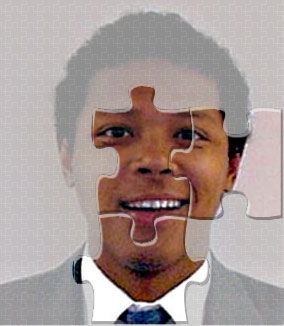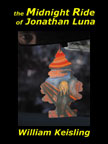Lawmaker asks Justice Department
Inspector General for independent investigation
into Jon Luna and Ray Gricar cases
December 4 , 2005 -- A prominent Pennsylvania lawmaker has asked the U.S. Justice Department's Inspector General Glenn A. Fine to conduct an independent investigation into the cases prosecuted by late Assistant U.S. Attorney Jonathan Luna and missing Centre County District Attorney Ray Gricar. This comes as citizens held a vigil for Luna, marking the second anniversary of his his death.
Rep. Mark Cohen (D-Philadelphia) wrote in his December 2, 2005, letter to Inspector General Fine, that he was requesting "a fresh, complete, and independent investigation by your office, using all available resources at your disposal, into the cases prosecuted by (Assistant U.S. Attorney Jonathan Luna and Centre County District Attorney Ray Gricar) leading up to their disappearances. No stones should be left unturned.
"...Due to its problems with its Confidential Informant in (the Luna) case, how can the public be assured that this case is being properly investigated by the FBI? The FBI has historically been recalcitrant to open itself to outside scrutiny over problems with its Confidential Informant program," Rep. Cohen wrote.
"While of course the grievous irregularities in this case by no means point to a suspect in Luna's death, the FBI certainly has a conflict in solving the case."
Below is the complete text of Cohen letters, with links to the court documents mentioned in his letter (click here to download PDF vervion [444k] of letter):
December 2, 2005
Inspector General Glenn A. Fine
Office of the Inspector General
U.S. Department of Justice
950 Pennsylvania Avenue, N.W.
Suite 4706
Washington, DC 20530-0001In the last two years in Pennsylvania, two dedicated prosecutors, each charged with upholding our laws, have met with mysterious and apparently violent ends within the borders of our commonwealth.
On December 4, 2003, Assistant United States Attorney Jonathan P. Luna was found dead, lying in a stream and stabbed thirty-six times, outside of Lancaster, Pennsylvania. Luna's death has been ruled a homicide by the Lancaster County coroner.
Luna had mysteriously vanished from his desk in the federal courthouse in Baltimore, Maryland, the night before. AUSA Luna had been working late on a troubled plea agreement involving violent, inter-state drug trafficking.
Some sixteen months later, on April 17, 2005, Centre County District Attorney Ray Gricar vanished without a trace under equally mysterious circumstances outside of Lewisburg, Pennsylvania. Shortly before his death, DA Gricar had announced the biggest inter-state drug investigation in the history of his county.
Both of these highly unusual cases, involving the disappearances of these two prosecutors, remain unsolved.
I am writing to request a fresh, complete, and independent investigation by your office, using all available resources at your disposal, into the cases prosecuted by these two public servants leading up to their disappearances. No stones should be left unturned.
This request is made necessary due to astonishing news reports that the current investigators do not take seriously the obvious and logical probability that both Mr. Luna and Mr. Gricar may have met with retribution due to the conduct of their jobs. Yet the alternatives seem even less likely.
Neither man, for example, left a suicide note, nor was either known to be depressed or suicidal.
Moreover, no evidence has been produced that either man was engaged in activities in his private life that could lead to, or otherwise readily explain, a disappearance or a violent death.
On the other hand, both men regularly prosecuted violent, career criminals and ruthless interstate drug traffickers. The job of a prosecutor entails risks that often go unrecognized in the United States. However, in other countries of the world, especially those choked by drug or public corruption, the disappearance of a prosecutor, a judge, or a journalist has tragically become almost an everyday occurrence, precisely because these societies have turned a blind or indifferent eye to very real risks caused by unaddressed social problems. We must take heed that these dangerous attitudes do not take root here.
And so I believe it is disingenuous, and ultimately dangerous to our society, to dismiss, off the cuff, the very real possibility that violent criminals who felt threatened by the work of these prosecutors may have separately conspired to harm one or both of these men. It is only prudent, and right, to fully, thoroughly, and independently examine the work of these men.
The public moreover deserves and expects a full and independent accounting of troubling aspects involving all cases handled by Jonathan Luna and Ray Gricar.
Mr. Luna's last case is particularly troubling. For example, court transcripts and documents from Mr. Luna's last case reveal egregious non-compliant activities in the handling of a FBI confidential informant named Warren Grace, and clear violations of the established guidelines and procedures of the U.S. Department of Justice, and the FBI, in the handling of Mr. Grace, and the failure to report Mr. Grace's Unauthorized Illegal Activities while he worked as an informant.
Page 108 of your own report, The Federal Bureau of Investigation's Compliance with the Attorney General's Investigative Guidelines (U.S. Department of Justice Office of the Inspector General, September, 2005), states:
"The FBI is required to notify either a U.S. Attorney or the head of a DOJ litigating component when a CI (confidential informant) engages in illegal activity which was not previously authorized, known as unauthorized illegal activity or 'UIA.' The Confidential Informant Guidelines require that notice of the unauthorized illegal activity be provided by the Special Agent in Charge of the field office operating the CI to the U.S. Attorney or DOJ component head, not by subordinate FBI field office personnel to other U.S. Attorneys' Offices or DOJ personnel...."
Yet, in Mr. Luna's last case, trial transcripts show these guidelines were ignored by members of the FBI's Baltimore Field Office's "Safe Streets Task Force," which was responsible for Confidential Informant Grace.
Mr. Luna's last case was United States of America v. Walter Poindexter and Deon Lionnel Smith (Docket No. WDQ-03-0213, U.S. District Court, District of Maryland).
In the hours before his death, Mr. Luna was engaged in preparing a hasty plea deal for this case, which was badly damaged when the unsupervised FBI informant ran amok in Baltimore. In the days leading up to Mr. Luna's death, defense attorneys learned belatedly that FBI confidential informant Grace had escaped home confinement, and was accused of shooting up his neighborhood and dealing heroin. Heroin was also found in Grace's vehicle while he was working as a confidential informant for the FBI. None of this was properly reported to defense attorneys and Mr. Luna, in court transcripts, makes no mention of having received the required Unauthorized Illegal Activities report from Grace's FBI handlers.
The plea deal which Luna was working on at the time of his disappearance served to prevent a court-ordered investigation in this matter of the Justice Department and the FBI, whose agents had mishandled the informant.
In the hours before his death, Luna repeatedly questioned the legality of the proposed plea deal, since, he argued, the proposed agreement would unlawfully forgive a drug murder. Luna, in fact, never completed the questionable plea agreement before he vanished.
Luna left behind, on his desk, his cell phone, his eyeglasses and the unfinished plea deal in his laptop. (His friends say he needed his glasses to see to drive.) The next morning, while Luna lay dead in the Pennsylvania stream, his associates at the Justice Department hastily rummaged through his office and hurriedly completed the plea deal, rather than sealing Luna's office and preserving it as a crime scene.
Yet, the night before his death, Luna repeatedly expressed doubts and concerns about the plea deal due to jurisdictional guidelines called "the federal nexus."
In short, the Government had improperly disregarded evidence that defendant Walter Poindexter, in the course of his drug trafficking activities, had shot a Baltimore man named Alvin Jones. Luna knew that a drug-related murder, under jurisdictional guidelines, compels federal prosecution, preventing a lawful plea deal.
In earlier court filings, Mr. Luna wrote that the government indeed had evidence that Mr. Jones' murder was drug related. (For example, on page 4 of the indictment, Luna wrote, "On January 22, 2001, Walter Oriley Poindexter, a/k/a 'Fella,' shot and killed Alvin Jones, a/k/a 'L,' because Poindexter believed Jones was responsible for burglarizing the stash house where the conspirators stored their heroin, money, and firearms."
Jones murder was clearly, under the guidelines, drug related, and, elsewhere, Luna wrote he had evidence and witnesses to establish this.
For example, in a court document titled, "Government's Response in Opposition to Severance of Defendants," filed October 30, 2003, Luna wrote on page 1, "Believing that Jones had burglarized the stash house, the government's evidence will show that upon finding Jones, Poindexter shot and killed Jones on January 22, 2001."
In the same court document, on page 4, Luna writes, "At least two of the witnesses in this case were involuntary witnesses to the murder of Alvin Jones."
Luna's doubts about the legality of a plea deal, due to the drug-related murder of Alvin Jones, consume the last hours of his life.
For example, on page 104 Line 15 of the trial transcript of December 3, 2003, Poindexter's attorney, Arcangelo Tuminelli, tells federal district court Judge William Quarles: "Judge, I think we are going to have a potential problem with--. Mr. Luna has advised me that he will not at sentencing seek to have the court find that the murder was related to this case. I don't know if he is going to be able to put that in a written agreement, for whatever reason."
The next morning, December 4, in court (while Luna is dead) defense and government lawyers tell Judge Quarles that, though Luna had his doubts, the issue has somehow been resolved. We read on pages 35 and 36 of the trial transcript of December 4, 2003, that Luna's replacement, Assistant U.S. Attorney James Warwick, tells Judge Quarles: "That is correct, your honor. As I explained at the bench, in my discussions with Mr. Luna yesterday, and Mr. Tuminelli, it is my understanding that the evidence regarding the fatal shooting indicates that it was not related to any narcotics distribution activity." Therefore, AUSA Warwick posits, the plea agreement is lawful. Yet Mr. Luna is dead, and cannot contribute his concerns.
There are obvious questions here:
-- Why wasn't this trial, involving a violent drug case, stopped with Mr. Luna's disappearance?
-- For the safety of other prosecutors, should guidelines be established to immediately stop trials in cases where prosecutors vanish?
-- Why was Mr. Poindexter never punished for the murder of Alvin Jones?
Due to its problems with its Confidential Informant in this case, how can the public be assured that this case is being properly investigated by the FBI? The FBI has historically been recalcitrant to open itself to outside scrutiny over problems with its Confidential Informant program.
While of course the grievous irregularities in this case by no means point to a suspect in Luna's death, the FBI certainly has a conflict in solving the case.
That is why I write to you. The public obviously deserves a full and complete investigation and accounting by your office into the handling of Mr. Luna's last case.
The public likewise demands a complete, independent investigation into the cases prosecuted by District Attorney Ray Gricar.
Sincerely,
Mark Cohen
State Representative

